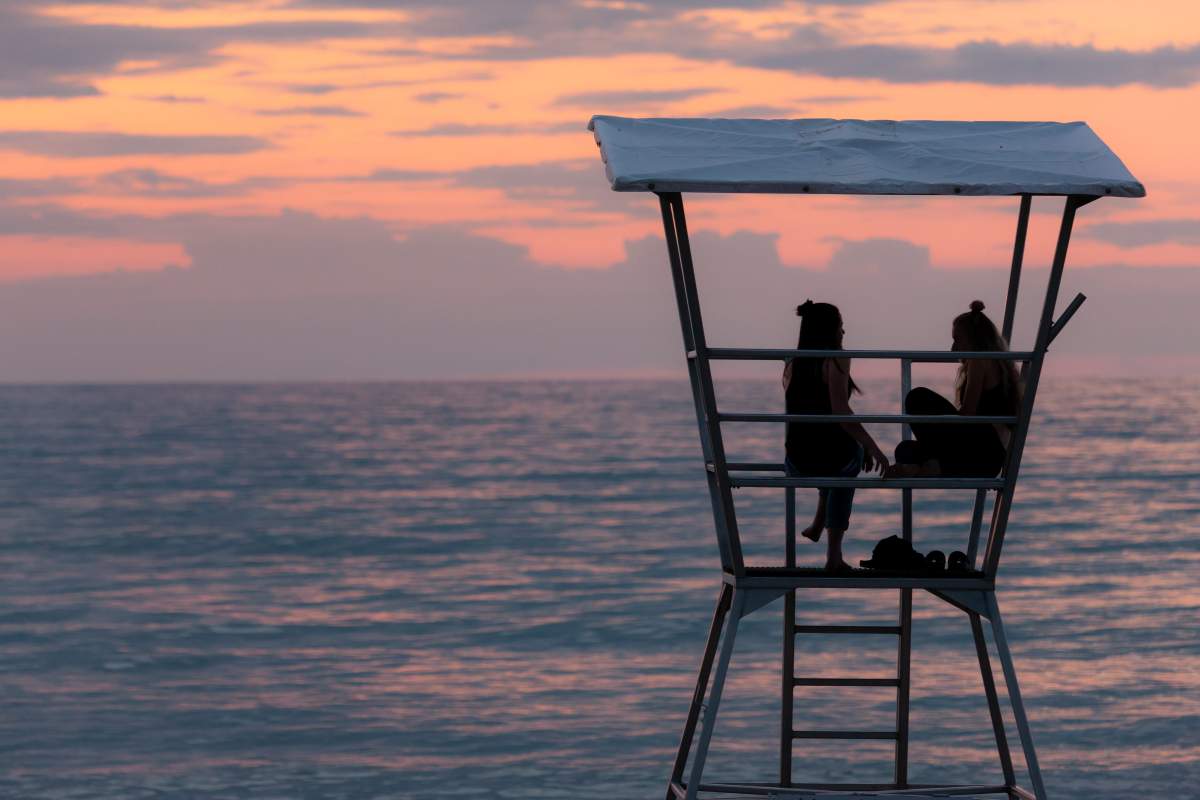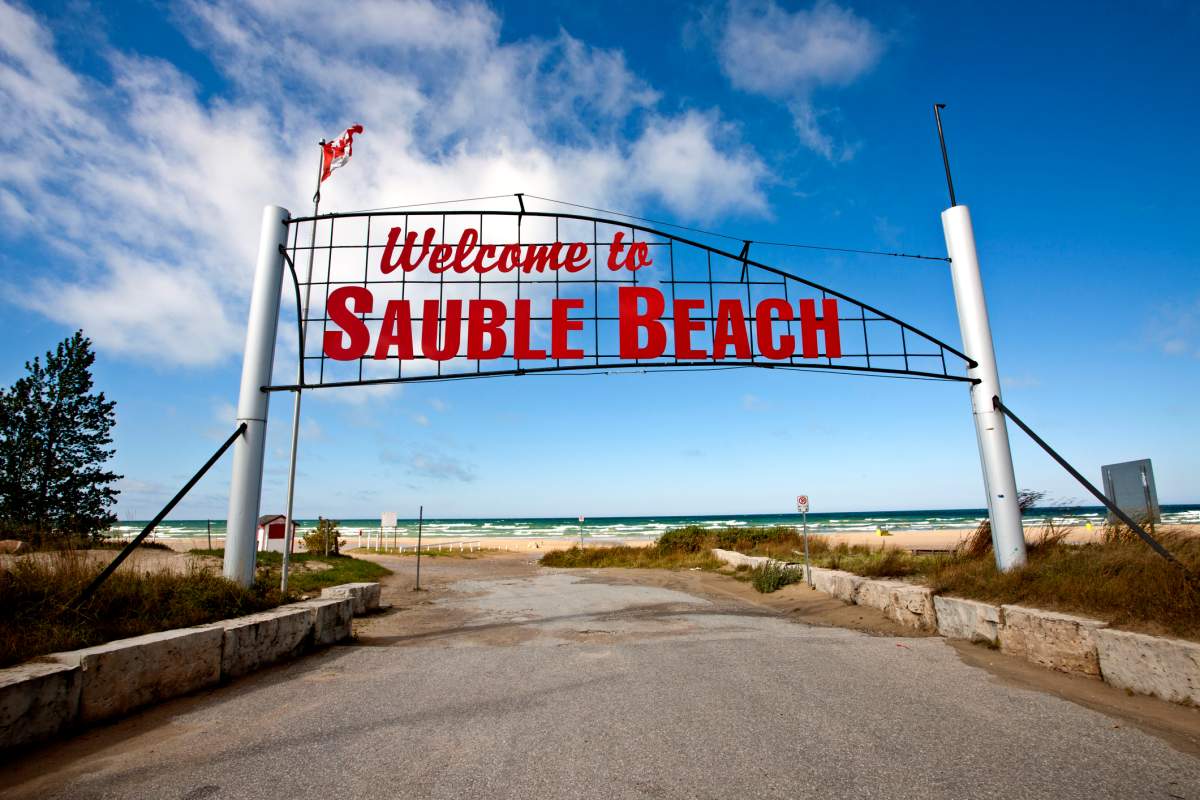With a hot, albeit potentially rainy, civic long weekend in store for Ontario’s London region, hundreds if not thousands of people are expected to venture out to area beaches for some time in the sun and sand.

But with the coronavirus pandemic still in full swing, the leaders of some local lakeshore communities are urging beach goers to behave themselves and follow safety guidelines.
“There’s a lot of local residents who are very concerned, as I am, with the influx of visitors,” said Bill Weber, mayor of Lambton Shores, in an interview Wednesday with 980 CFPL’s Jess Brady.
Lambton Shores includes several popular beachfront communities, including Grand Bend, Port Franks and Ipperwash.
“People have been cooped up and they’re really wanting to get out, and they’re forgetting that COVID is still around, so it’s quite concerning.”
Overcrowding has been a problem at several of the municipality’s beaches, he says. Grand Bend beach crowds in particular have been consistently large over the last several weekends thanks to the hot weather.
As many as 7,000 people crowded the town’s main beach during the Canada Day long weekend earlier this month, resulting in some 250 bylaw tickets being issued for things like smoking, drinking, and failing to social distance.
“It’s very disappointing to see –the young people, especially– that come, the day-trippers, and leave their brains behind… So those few people that are doing that, I’m asking them to stay away. We don’t need that type of behaviour in our community.”
Masks aren’t currently mandated in Lambton Shores or in Lambton County — the region’s health unit says it has no plans to implement a countywide mandate — but those visiting the municipality are still being encouraged to wear them.
“COVID is still here. Our businesses are busy. Everything is lined up,” he said.
“You might not have as good a time as you think you’re going to have.”
Weber added that those who do plan to venture out to one of the municipality’s beaches are being advised that bylaw officers and police officers will be out in full force enacting a zero-tolerance approach.
“If you can’t behave, and you don’t have a spot, you really need to go someplace else or stay home. Your beer will be colder in your backyard than it will be sitting on the beach — and you’re going to get a ticket on the beach.”
A similar sentiment is being echoed by the mayor of Central Elgin, which includes Port Stanley.
“This August civic holiday weekend is one of our busiest. That’s been traditional,” said Sally Martyn on Friday during an interview with 980 CFPL’s Jess Brady.

Get weekly health news
“What we’re saying to people is if the parking lots are all full — and we have a large number of parking lots and parking spaces — if those are full, the beach is full. Don’t try to park illegally and go to the beach. We’ve been having a fair issue with that.”
Masks are now required in indoor public spaces in the county by way of an instruction from the regional health unit. The instruction came into effect Friday.

“It will protect you slightly, but it’s mainly to protect all those you come in contact with.”
The mask mandate comes as the region has seen a spike in coronavirus cases over the last two weeks. The region’s total case count rose from 87 on July 17 to 143 on July 31.
Nearly half of the active cases in Elgin and Oxford counties are in Aylmer, however, four cases have been reported in nearby St. Thomas, and one case is active in Central Elgin itself, the health unit says.
“Most people are very compliant and others have just been very belligerent,” Martyn said.
“You know, ‘you can’t make me wear a mask,’ and ‘I’m going in whether you want me to or not.’ Or they’ll take the mask and then go inside and take it off. So it really does help,” she said of the mandate.
For the most part, however, Martyn says beachgoers who have been visiting Port Stanley and other area beaches over the last several weeks have been well behaved.
“People have been following instructions, and when a fireman or a bylaw officer speaks to them and reminds them if they’re not doing it correctly, they’ve always been very cooperative and done as they have been asked,” she said.
“We’ve been very pleased with how things have been going at the beaches.”
Outside of the London region, the mayor of South Bruce Peninsula, Janice Jackson, says people have also been well behaved for the most part, and adds things have been much better than they were in early-to-mid June.
The region tentatively opened its lakefront in early June for “walk-through access,” but reversed course two weeks later after its beaches, particularly Sauble Beach, were overwhelmed by people not following restrictions or provincial guidelines, including city day-trippers, Jackson said at the time.
South Bruce council reopened beaches on July 3, with the second reopening attempt coming with enforcement on weekends and weekly assessments of compliance.
“I think closing the beach for that two week period was a good move. I think it happened early in the season before the thick of the summer really hit us,” Jackson said Thursday during an interview with 980 CFPL’s Mike Stubbs.
“I think it really sent a very strong message that, ‘listen, if you don’t respect our beach, you won’t have our beach to visit.’ I think that strong message really resonated because people have been terrific ever since.”
Jackson says beachgoers have been taking their time picking spots that are further away from others, a task made more challenging due to higher water levels.
“Normally we have football field-size beaches, but now, even though it’s still four kilometres long, the width is only five feet, ten feet. Some 30 per cent of the beach is gone completely. The water is right up to the dunes,” she said.
“It’s cyclical,” she said of the rising waters. “It did happen to us in, I believe it was 1984, and the water was right up to the dunes as well. But then when it recedes, it leaves a beautiful, clean beach that’s really wide.”
The region’s health unit, which also covers Grey County, has reported a total of 119 cases during the pandemic, of which 115 have recovered. It implemented a region-wide mask order in mid-July.
A total of three cases have been reported in South Bruce Peninsula. The most recent case was in late April. All three cases later recovered.
Despite the low caseload in the area, Jackson knows it doesn’t take much for things to get out of hand, hence the June beach closures.
“I don’t think Sauble Beach has ever been closed in its existence,” she said, describing the decision as a heavy but necessary one.
“COVID is nothing to mess around with, we got to take it very seriously.”
— With files from The Canadian Press

















Comments